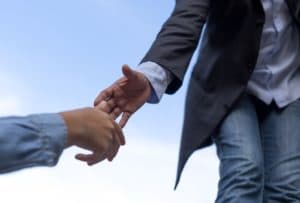
Have you ever passed by a car accident scene and wondered whether you should stop and help the injured? Or did no one stop to offer you help at the scene of your collision? For many people, they don’t stop to help out of concern that they might get sued for doing something wrong. Fortunately, Virginia law addresses this issue.
The state’s Good Samaritan Law, Va. Code § 8.01-225, generally protects those who try to help accident victims. The law shields a person who acts reasonably to help someone in need at the scene of a wreck from liability.
Why Does Virginia Law Protect Good Samaritans?
The law protects people who stop to help because it encourages people to help each other during an emergency. If the law provided no protection for those who did try to help others in emergency situations, then far fewer people would.
How Does Virginia’s Good Samaritan Law Work?
Under Virginia law, anyone who renders emergency aid to someone who is at risk of serious harm or death is immune from civil liability for injuries or death of that person. However, several conditions must exist in order for a person to receive this protection. The person must:
- Act in good faith – The person who renders aid must have done so with the intention of helping as opposed to having a profit motive or some other motive. As a legal term, good faith generally describes a state of mind or purpose behind conduct. For instance, if an at-fault driver tries to help an injured person so they won’t call the police, that person may not be acting in good faith.
- Not receive compensation – If you charge for medical care, then you are no longer a Good Samaritan. The law protects only individuals who volunteer to help.
- Avoid grossly negligent conduct – If the person acts unreasonably under the circumstances when trying to help, he or she may not be protected against liability for any injuries caused while trying to render emergency assistance.
- First make reasonable attempts to summon law enforcement, fire or EMS personnel – The person must make some reasonable attempt to contact the authorities. Simply calling 911 could satisfy this condition.
Reasonableness is a relative term. Generally, if a person’s actions in an emergency cause injury and result in that person getting sued, a jury would need to determine whether the person acted “reasonably” under the circumstances. In other words, the jury would need to determine if the person acted the way a reasonable person in the same situation would have acted.
Who Does the Good Samaritan Law Protect?
Virginia’s Good Samaritan law is very broad and covers many situations, generally including:
- Helping someone out of a vehicle or administering first aid at the scene of a car accident or other emergency scene
- Helping deliver a baby in an emergency situation
- Acting at the instruction or request of police, fire or EMS personnel to handle or transport hazardous materials
- Administering epinephrine (with use of an epi-pen)
- Performing CPR
- Using an automated external defibrillator (AED) in a reasonably prudent manner.
When Can Someone Who Provides Emergency Care Be Sued?
In some circumstances, a person who stops to try to help can be sued. Consider the following scenarios:
- A person who has never been trained in CPR believes a victim is unconscious because of cardiac arrest. Without confirming lack of a pulse and that the victim wasn’t breathing, that person begins pounding on the victim’s chest, fracturing several of the victim’s ribs. If a jury determines it was unreasonable for an untrained person to try to perform CPR under those circumstances, he or she could lose a lawsuit for causing the victim’s broken rib injuries.
- You are in a car accident, and your vehicle is on fire. Someone actually stops and rushes to help you. The person drags you from the burning car, but in the process, your arm gets sliced on sharp piece of metal. As long as the person acted voluntarily and in good faith, the Good Samaritan law would likely protect that person from liability.
- Consider a slightly different take on the previous example. Assume there is some smoke from your engine, but no fire. You are able to unbuckle your seatbelt and calmly step out of the vehicle on your own. A driver sees you and stops to help. In a misguided effort to “rescue” you from being near your smoking vehicle, the driver unreasonably pushes you into an oncoming car and causes you to suffer serious injuries. A jury may determine that the would-be Good Samaritan is responsible for your injuries from being hit by the oncoming car.
If someone does stop to help you, always ask for the person’s name, address, and phone number. You may need that person as a witness in your personal injury case. At the very least, you can later properly express your gratitude to that person for being a Good Samaritan!
Our VA Car Accident Attorneys Are Ready to Help You
For more than 100 years, the law firm of Marks & Harrison has fought to protect injured people all over Virginia. With offices throughout the state, including Richmond, our legal team is ready to answer your toughest legal questions and fight for your rights. Don’t trust the insurance company to act in your best interests. Contact us today for aggressive and knowledgeable legal representation.

